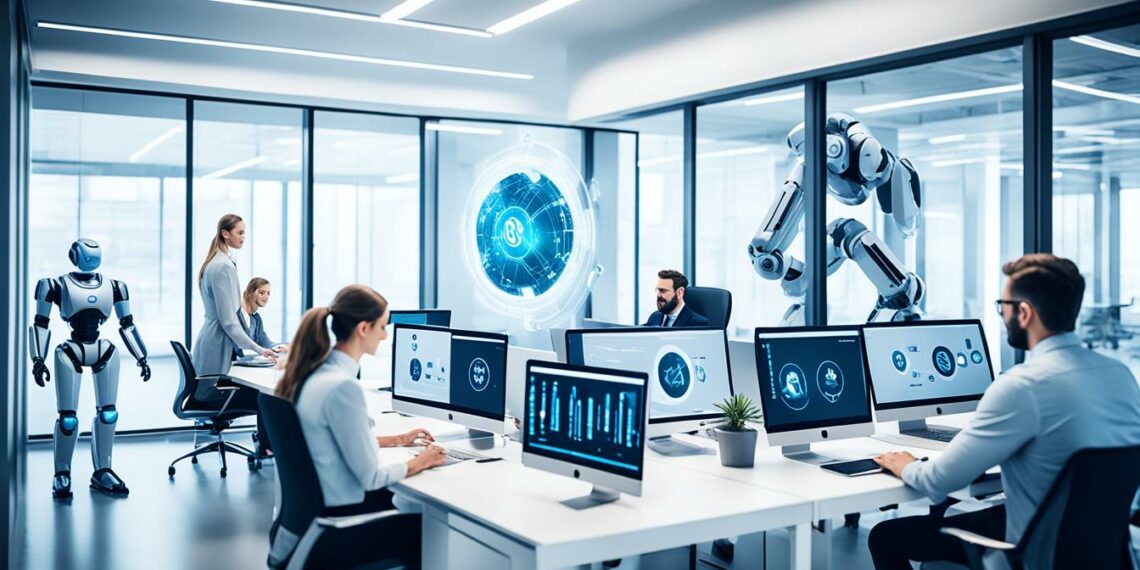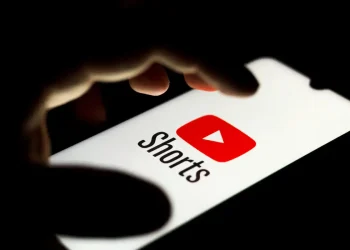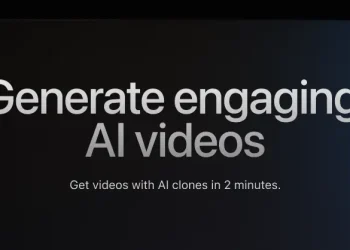Did you know that 76% of HR leaders think AI is key to staying ahead? AI is becoming a big part of how companies work today. 1 in 4 companies are using AI to make their HR work better. This shows a big move towards smarter, more efficient ways of doing things.
AI is making hiring easier and changing jobs in HR departments. For example, Unilever saved over 100,000 hours in interview time and cut recruitment costs by about $1 million in a year with AI tools. This change lets HR workers focus on bigger, more important tasks. They’re becoming talent architects and experience designers.
It’s important to understand how AI is changing HR. Companies want to work better and make employees happier with AI’s help.
Key Takeaways
- 76% of HR leaders see AI adoption as crucial for competitive advantage.
- 1 in 4 organizations currently leverage AI in HR.
- 85% report significant efficiency gains using AI.
- Unilever saved 100,000 hours of interviewing time in one year with AI.
- AI allows HR to focus more on predictive workforce models and strategic roles.
- Overall positive perception of AI integration is noted by 89% of global HR leaders.
The Growing Importance of AI in Human Resources
Organizations are now seeing the big benefits of using AI in HR. They’re using artificial intelligence to make many processes better. This change is a big step towards managing workers more effectively and efficiently.
AI Adoption Rates Among HR Leaders
More and more HR leaders are looking into using AI. They want to keep their companies ahead of the game. Here are some important facts:
- 76% of HR leaders think not using AI could hurt their success.
- 52% are checking out how to use generative AI, showing they’re open to new tech.
- 40% of workers might need new skills because of AI and automation in the next three years.
Impact of AI on Organizational Success
AI does more than just automate tasks. It gives insights on how the workforce works, helping make better decisions. This affects many key areas:
| Area of Impact | Description |
|---|---|
| Workforce Insights | AI collects and analyzes data to help make important HR decisions. |
| Streamlining Processes | Automating simple tasks lets HR focus on big projects and work better. |
| Personalized Employee Experiences | AI makes experiences for employees unique, which boosts their happiness and involvement. |
HR leaders should encourage exploring AI but also set clear goals to track its success. As companies use more AI in HR, building trust and being open with employees is key to showing AI’s worth.
Benefits of AI for Human Resources
AI in Human Resources brings big changes that make things run smoother and improve how employees feel. It helps tackle tough issues like bias in hiring and supports learning and growth.
Mitigating Bias in Recruitment
AI is now key in finding new talent in many companies. A big plus is reducing bias in hiring. Automated tools make applying for jobs easier and talk to candidates in a way that grabs their interest. AI checks to make sure hiring follows the law and is fair.
Enhancing Learning and Development Opportunities
AI changes how we grow and learn at work. Over 80% of people learn better with training made just for them. AI creates learning paths by looking at what skills and styles each person has. It uses simulations to let new hires practice their jobs in real-life situations, making them more confident.
AI also gives feedback right away, helping HR see how new employees are doing. This helps them fit in better with the company.
| AI Application | Description | Benefits |
|---|---|---|
| Automated Recruiting Tools | Enhance candidate experience through an efficient application process. | Streamlined hiring, better engagement. |
| AI Algorithms | Analyze employee data to reduce bias. | Improved diversity and compliance. |
| Personalized Learning Programs | Tailored training experiences based on employee skill sets. | Higher retention rates and skill development. |
| Performance Management Systems | Identify learning gaps through real-time analysis. | Enhanced employee engagement and retention. |
AI makes HR tasks faster and gives a more personal touch to candidates and employees. This shows the huge benefits of AI in HR. It’s key in building a workforce that’s adaptable and skilled.
AI for Human Resources: Streamlining Talent Acquisition
In today’s job market, finding the right candidates is tough. Using AI changes how companies look for talent. It helps find the skills needed for each job, making hiring easier.
Identifying Skills for Job Roles
AI looks through lots of data to find key skills for jobs. This makes finding the right candidates quicker and more precise. Companies are now hiring faster thanks to AI.
Crafting Effective Job Descriptions
Writing good job ads is key to drawing in the right people. AI helps write these ads, making sure they’re clear and fair. This helps attract a diverse group of candidates. Tools like Veritone Hire also save time and make hiring better.
More companies are using AI for hiring, and it’s saving them money and making things more efficient. McKinsey found that AI can save time and resources and make hiring more accurate. Using AI in hiring makes the process easier and helps keep employees happy.
| AI Tool | Benefit | Impact |
|---|---|---|
| Workable | Automates routine tasks | Enhances recruitment workflow |
| Veritone Hire | Optimizes job advertising | Increases campaign ROI |
| AI Analytics | Predicts candidate suitability | Improves screening accuracy |
| AI Platforms | Mitigates bias in recruitment | Promotes fairness in hiring |
AI-Driven Employee Engagement and Experience
AI is changing how companies manage their teams. Many HR leaders see AI’s value, so companies are using it to improve feedback and encourage growth. In the U.S., only 32% of employees are engaged, showing the need for new ways to keep workers motivated.
Implementing AI for Performance Management
AI helps make managing performance easier. It accurately checks how well employees work and gives useful data. With AI, companies can make reviews based on current numbers, making them more accurate.
Also, 84% of HR experts think AI will make them more productive. This shows AI is a key tool for engaging employees.
Real-Time Feedback Mechanisms
Getting feedback quickly is key for growth. AI-driven systems give fast insights on how employees are doing and where they can improve. This makes learning and development more personal.
AI also spots trends in how engaged employees are. This helps HR teams make plans to keep workers. With 66% of HR teams focusing on keeping employees, AI is crucial for these efforts.
| Statistic | Percentage |
|---|---|
| Employee Engagement in the US | 32% |
| HR Teams Prioritizing Employee Retention | 66% |
| HR Leaders Planning to Integrate Generative AI | 72% |
| Companies Utilizing AI in Hiring and Onboarding | 68% |
| HR Professionals Expecting Enhanced Productivity from AI | 84% |
Automation of HR Processes
Automating HR processes has changed the game in payroll and onboarding. With new tech, companies can work better and make fewer mistakes. They also cut down on paperwork.
Payroll Processing Automation
Automation in HR shines in payroll processing. It makes handling payroll data easier and more accurate. Errors in manual reports can be up to 20%. Automation cuts these errors and makes paying employees smooth and right on time.
Companies using automated payroll see big gains in speed and accuracy. This means employees get paid correctly and on time.
Employee Onboarding Optimization
Automation makes onboarding better too. Old ways of onboarding took a lot of time and effort. Now, automated systems help new hires with reminders and documents, making it easier for them.
For example, KPMG saw a big jump in satisfaction after using new onboarding software. This kind of automation helps new employees settle in faster. It makes them happier and more engaged from the start.
| Company | Implementation Benefit | Impact on Applicant Experience |
|---|---|---|
| Osceola County Sheriff’s Office | Saved $2,000 on office supplies | Increased efficiency in HR operations |
| KPMG | Integrated onboarding software | 4.45/5 hiring experience rating |
| Johnson & Johnson | Strategic AI adjustments | 9% increase in female applicants |
Automating HR tasks like payroll and onboarding does more than just improve accuracy. It also makes working life better for employees. As companies keep adding these tech tools, HR can focus on big-picture goals instead of day-to-day tasks.
The Role of HR Analytics Software
HR analytics software is key in making HR decisions based on data. It uses technology to give insights that help make better choices. These insights help align HR strategies with business goals.
Data-Driven Decision Making
In North America, many companies struggle with people analytics. About 3,000 organizations have little to no access to these tools. This lack leads to a big waste, around $600 million on average.
HR analytics software helps businesses use data over gut feelings. This makes them more effective. Predictive analytics can also improve planning for the workforce. Almost two-thirds of chief HR officers think AI will help their roles.
A study by IBM found that half of these leaders saw AI’s potential before the pandemic. This shows AI’s big impact on HR roles.
Predictive Analytics for Talent Management
Predictive analytics in talent management uses data to spot patterns. This helps in making better hiring and keeping strategies. It lets HR teams find and fix talent gaps early.
AI in people analytics reduces bias in hiring. It makes sure all candidates are treated fairly. Tools that use AI with applicant tracking systems help in screening resumes better.
AI also gives insights on employee engagement and turnover risk. This helps HR managers boost productivity and morale.
| Metric | Statistic |
|---|---|
| Companies lacking people analytics | 3,000 |
| Estimated economic loss | $600 million |
| HR leaders using AI for tasks | 42% (for companies with 5,000+ workers) |
| Chief HR officers seeing positive AI impact | Nearly two-thirds |
| Employee belief in AI support | 82% |
Using HR analytics software helps make HR decisions based on data. This leads to better efficiency and happier employees. The future of HR depends on using these insights for better talent management. This leads to stronger performance and success at work.
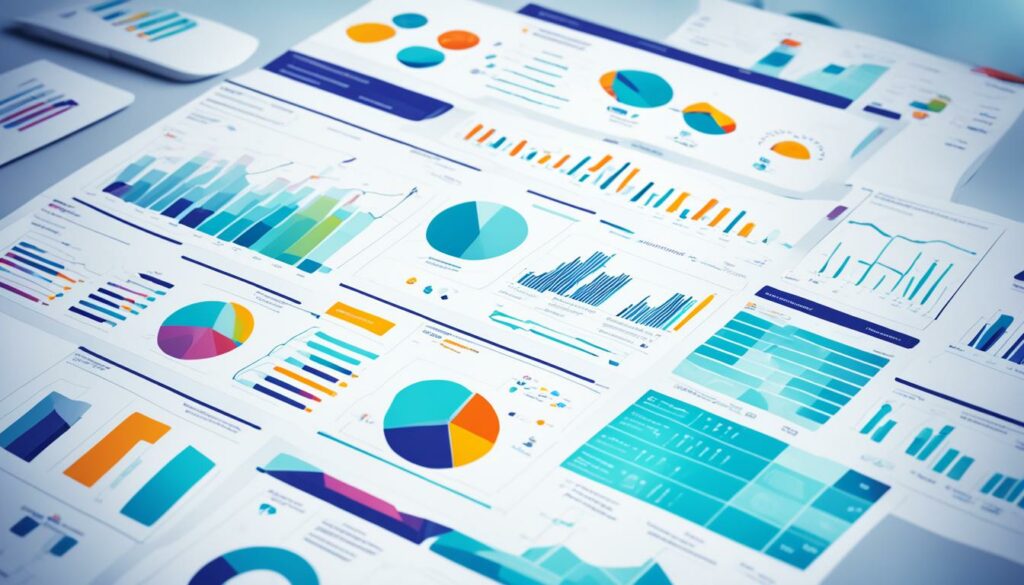
Concerns and Challenges of AI in HR
AI in human resources has many benefits, but it also has big concerns. Trust and transparency in AI decisions are key. Many sectors use AI to analyze data and make better decisions. But, 47% of HR leaders worry about trusting AI. This shows we need to be clear about how AI makes decisions.
Trust and Transparency Issues
It’s crucial to be open about AI decisions to build trust. Companies must make sure AI systems are clear and open to review. Trust comes from understanding AI processes. This helps solve the challenges of AI in HR caused by distrust or confusion.
Potential for Bias and Legal Risks
AI can help reduce bias in hiring, but it’s not perfect. Old data can bring in biases, leading to unfair results. If companies don’t check AI tools well, they could face legal issues. HR needs to know these risks to make a fair workplace.
| Concerns | Implications |
|---|---|
| Trust in AI Decisions | Need for clear communication; requires transparency |
| US Human Resource Discrimination Laws | Potential legal liabilities if AI tools are biased |
| Employee Trust | Employees may feel alienated without transparency |
| Bias in Data | AI may replicate existing societal biases |
Fixing these problems is key to using AI well in HR. Being open and addressing bias will make AI more effective in human resources.
AI Solutions for Enhanced Recruitment Efficiency
Organizations are now using AI to make hiring better. They use automated resume screening and AI to schedule interviews. This makes hiring faster and more efficient, saving time and resources. It also helps attract the best candidates.
Automated Resume Screening
Automated resume screening changes how HR looks at candidates. It quickly finds the right candidates by looking for key words and qualifications. This means less time spent on the first round of screenings.
Recruiters can then focus on more important tasks. McKinsey says using Generative AI can make HR work 30% more efficient. This means hiring gets better too.
Interview Scheduling and Management Tools
AI helps schedule interviews, making it easier to coordinate. Tools like Manatal and HireVue use AI to set up interviews fast and efficiently. This means interviews happen quicker and are better organized.
Using AI in hiring makes things run smoother. It lets HR focus on big-picture goals. This helps the whole organization grow.
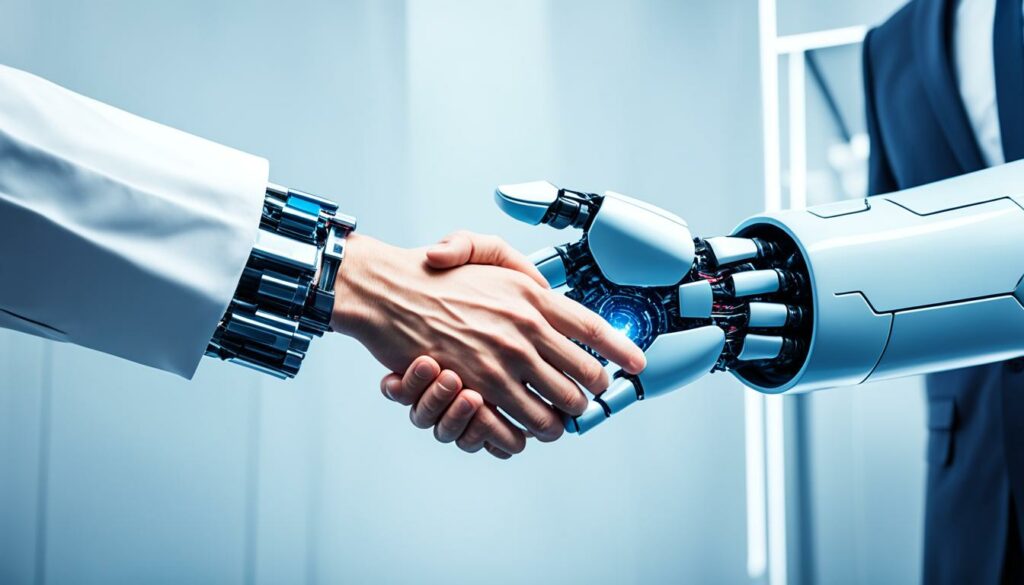
| Feature | Benefit |
|---|---|
| Automated Resume Screening | Reduces time on initial candidate evaluations |
| AI Interview Scheduling | Streamlines coordination and improves candidate communication |
| Enhanced Recruitment Workflow | Allows HR teams to focus on strategic tasks |
| Data-Driven Insights | Informs better decision-making for talent acquisition |
Future Trends in AI for Human Resources
The future of AI in HR is all about better tech integration and evolving AI skills. Leaders know that not using AI could put them behind in the market. They see a big trend: 76% of HR leaders think not using AI soon will make them fall behind others who do use it. Adding AI to HR systems will make hiring better and improve how employees feel.
Integration with Existing HR Tech
More HR leaders, 81%, are looking into or using AI to make things run smoother. But, 37% say it’s hard to add AI to what they already have. Those who do connect AI with their HR systems see big wins, like cutting time to hire by 50%. This shows the need for new ways to blend AI into what we already use.
The Evolution of AI Capabilities
AI will change how HR handles talent. By 2025, 63% of HR pros think AI and automation will change HR a lot. AI can analyze data much faster, helping companies make quick, smart choices. Tools like AI cut down on paperwork by 66%, letting HR focus on keeping and attracting great employees. AI can also make employees 30% more engaged and improve how well they’re evaluated by 91%.
| Key Statistics | Impact of AI in HR |
|---|---|
| 76% | Belief that not adopting AI will decrease organizational success |
| 81% | Currently exploring or utilizing AI for efficiency |
| 50% | Reduction in time-to-fill open positions with AI |
| 66% | Reduction in administrative workload due to AI |
| 30% | Improvement in employee engagement from AI tools |
Companies that jump on these new tech trends will get ahead in managing talent and keeping employees happy. This marks a big change in the future of AI in HR.
Conclusion
AI is changing the game in human resources. It’s making recruitment, employee engagement, and performance management better. This tech is setting the stage for a more efficient HR world.
AI brings big benefits like making companies work better and reducing bias in hiring. A LinkedIn report shows more people want AI skills, proving its importance in the job world.
Now, 81% of companies use AI in HR, as seen in the 2020 RELX Emerging Tech Executive Report. This shows that investing in AI can make employees happier and work processes smoother. But, it’s key to tackle trust and transparency issues to keep things fair and build trust with employees. Good data is crucial for AI to work well.
The future looks bright for AI in HR. HR leaders should see AI as tools that can make work more personal and help make better decisions. For more on AI’s impact, check out its role in finance at this link. The path to using AI in HR is exciting, helping companies succeed in today’s tough market.
FAQ
What is AI for Human Resources?
AI for Human Resources uses artificial intelligence to make HR tasks easier and better. This includes things like finding the right employees, keeping workers happy, managing how well they do their jobs, and analyzing HR data.
How does AI improve recruitment processes?
AI makes hiring better by doing tasks like checking resumes and setting up interviews automatically. It finds the right skills for jobs and helps write job ads. It also makes sure hiring is fair.
What are the key benefits of AI in talent management?
AI in talent management helps avoid bias in hiring. It improves learning chances for employees. It also helps manage how well people do their jobs with feedback and plans for the future.
What role does AI play in employee engagement?
AI is key to keeping employees happy by using data to check how productive they are. It helps manage their performance and encourages constant feedback and growth.
What challenges arise with the adoption of AI in HR?
Using AI in HR can be tricky. There are worries about trust and being open, biases in algorithms, legal issues with AI decisions, and keeping AI systems ethical.
Can AI help address bias in hiring decisions?
Yes, AI can tackle bias in hiring by looking at job ads, pointing out biased words, and making sure hiring is based on skills, not opinions.
What technologies are commonly used in AI-driven HR solutions?
AI-driven HR uses tech like machine learning for recruitment, HR analytics software, automated HR tasks, and apps for engaging with employees.
How does HR analytics software contribute to decision-making?
HR analytics software helps make decisions by analyzing data. It lets companies see what they need in terms of talent, improve hiring and keeping employees, and find ways to work better.
What impact does AI have on payroll processing?
AI makes payroll processing faster and more accurate by handling the data. This makes things clearer, cuts down on mistakes, and lets HR focus on big-picture tasks.
What is the future of AI in Human Resources?
The future of AI in HR is about working better with current HR tools and getting even better. We can expect more advanced uses in finding employees, managing performance, and keeping workers engaged as technology gets better.
